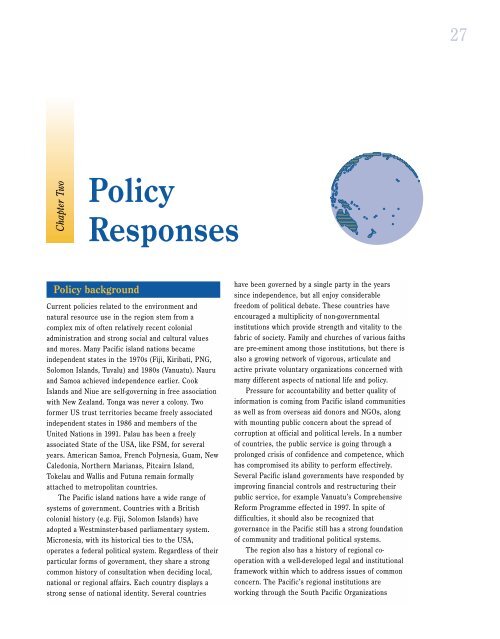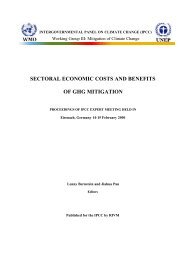Pacific Islands Environment Outlook - UNEP
Pacific Islands Environment Outlook - UNEP
Pacific Islands Environment Outlook - UNEP
Create successful ePaper yourself
Turn your PDF publications into a flip-book with our unique Google optimized e-Paper software.
27<br />
Chapter Two<br />
Policy<br />
Responses<br />
Policy background<br />
Current policies related to the environment and<br />
natural resource use in the region stem from a<br />
complex mix of often relatively recent colonial<br />
administration and strong social and cultural values<br />
and mores. Many <strong>Pacific</strong> island nations became<br />
independent states in the 1970s (Fiji, Kiribati, PNG,<br />
Solomon <strong>Islands</strong>, Tuvalu) and 1980s (Vanuatu). Nauru<br />
and Samoa achieved independence earlier. Cook<br />
<strong>Islands</strong> and Niue are self-governing in free association<br />
with New Zealand. Tonga was never a colony. Two<br />
former US trust territories became freely associated<br />
independent states in 1986 and members of the<br />
United Nations in 1991. Palau has been a freely<br />
associated State of the USA, like FSM, for several<br />
years. American Samoa, French Polynesia, Guam, New<br />
Caledonia, Northern Marianas, Pitcairn Island,<br />
Tokelau and Wallis and Futuna remain formally<br />
attached to metropolitan countries.<br />
The <strong>Pacific</strong> island nations have a wide range of<br />
systems of government. Countries with a British<br />
colonial history (e.g. Fiji, Solomon <strong>Islands</strong>) have<br />
adopted a Westminster-based parliamentary system.<br />
Micronesia, with its historical ties to the USA,<br />
operates a federal political system. Regardless of their<br />
particular forms of government, they share a strong<br />
common history of consultation when deciding local,<br />
national or regional affairs. Each country displays a<br />
strong sense of national identity. Several countries<br />
have been governed by a single party in the years<br />
since independence, but all enjoy considerable<br />
freedom of political debate. These countries have<br />
encouraged a multiplicity of non-governmental<br />
institutions which provide strength and vitality to the<br />
fabric of society. Family and churches of various faiths<br />
are pre-eminent among those institutions, but there is<br />
also a growing network of vigorous, articulate and<br />
active private voluntary organizations concerned with<br />
many different aspects of national life and policy.<br />
Pressure for accountability and better quality of<br />
information is coming from <strong>Pacific</strong> island communities<br />
as well as from overseas aid donors and NGOs, along<br />
with mounting public concern about the spread of<br />
corruption at official and political levels. In a number<br />
of countries, the public service is going through a<br />
prolonged crisis of confidence and competence, which<br />
has compromised its ability to perform effectively.<br />
Several <strong>Pacific</strong> island governments have responded by<br />
improving financial controls and restructuring their<br />
public service, for example Vanuatu’s Comprehensive<br />
Reform Programme effected in 1997. In spite of<br />
difficulties, it should also be recognized that<br />
governance in the <strong>Pacific</strong> still has a strong foundation<br />
of community and traditional political systems.<br />
The region also has a history of regional cooperation<br />
with a well-developed legal and institutional<br />
framework within which to address issues of common<br />
concern. The <strong>Pacific</strong>’s regional institutions are<br />
working through the South <strong>Pacific</strong> Organizations

















